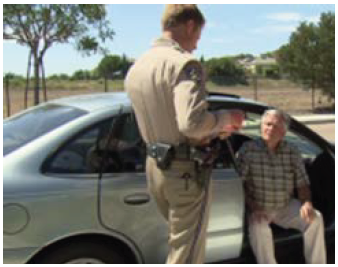U.S. Department of Transportation
Federal Highway Administration
1200 New Jersey Avenue, SE
Washington, DC 20590
202-366-4000
Age–related driving impairment is a serious and growing public health and safety problem. Older drivers have crash rates per mile driven similar to teenage boys, but have more than four times the fatality rate that younger drivers do. Law enforcement officers, who have traditionally been lenient with older driver violators, play an important role in identifying cognitively impaired drivers. Older drivers with cognitive impairments often exhibit erratic driving behaviors resembling a DUI; however, it can be difficult to distinguish cognitive impairment during a traffic stop without a targeted assessment.
The Training, Research and Education for Driving Safety (TREDS) group at the University of California (UC), San Diego, collaborated with the California Highway Patrol and the California Department of Motor Vehicles (DMV) to develop and deliver the POST–certified (Peace Officer Standards and Training) training, Law Enforcement's Role in Older Driver Safety. The Driver Orientation Screen for Cognitive Impairment (DOSCI) tool for law enforcement was developed as part of this training to aid in the identification of cognitive impairment at traffic stops. The DOSCI tool was validated at the UC San Diego Alzheimer's Disease Research Center. The training program and the DOSCI tool provide a model for how law enforcement and public health organizations can work together to keep the public safe as drivers age and are driving longer.
At a traffic stop of the potentially impaired driver, the DOSCI guides the officers to first screen for intoxication then to rule out any medical issues. Once these are ruled out, the officer is to conduct a nine question exam to determine the driver's orientation of person, place, and time. The questions include the driver's date of birth, full home address, state and town currently in, time estimate (within an hour), day of week, and the current date. The DOSCI tool includes suggested actions based on the score. The purpose of the tool is to guide and aid the officer, but officers are also expected to use their own judgment.

Figure 8. Law enforcement screening driver for cognitive impairment with DOSCI tool
Source: TREDS – Training, Research and Education for Driving Safety, University of California, San Diego
In California, over 2,500 officers are currently trained on how to use the DOSCI tool. In surveys administered immediately after–training, 89 percent responded they were likely or very likely to incorporate the DOSCI into their assessment of older drivers, and 92 percent responded that the results of the DOSCI will help in preparing the DMV "Notice for Priority Re-Examination of Driver." Officer interviews conducted 2 years after the training were equally positive. The TREDS training, with the DOSCI tool, has been well received, and found to be feasible and useful in the field. Funding for this program was provided by a grant from the California Office of Traffic Safety through the National Highway Traffic Safety Administration.
Agency: University of California, San Diego Training, Research and Education for Driving Safety (TREDS)
Contact: Linda Hill, MD, MPH
Telephone: 858–534–9330
Email: Llhill@ucsd.edu
There are times when a person's medical condition may require an assessment to determine their ability to safely operate a vehicle. The Maryland Motor Vehicle Administration (MVA) has a multi– tiered system for referring, screening, and evaluating an individual's medical fitness to drive. The mission statement of the MVA is to provide exemplary driver and vehicle services that promote Maryland's mobility and safety while enhancing process and product security.
The use of a Functional Capacity Screening Test (FCT) has become routine in Maryland. The FCT screening consists of a short series of tests that measure basic visual, cognitive, and physical abilities that are needed to safely operate a motor vehicle. While FCT screening cannot predict a safe or unsafe driving experience, poor results can be a warning sign that a person is placing themselves, or others, at a higher risk when driving. A driver's license cannot be suspended simply because of poor performance in one or more segments of the FCT; however, poor test scores are a concern and may cause the reviewer to require a driving skills test with the MVA. FCT screenings are recommended for drivers who are referred to the Medical Advisory Board (MAB) or the Division of Driver Wellness and Safety because of concerns about physical and mental decline that can affect their ability to drive safely.3
The MAB is composed of physicians from various medical specialties who assess an individual's medical fitness to drive when there is a medical condition that can impact the person's ability to safely operate a vehicle. The MAB reviews the medical information of drivers and then provides advice and recommendations to the Driver Wellness and Safety Division of the MVA. Each case is reviewed on an individual basis.
When a person is referred to the MAB for evaluation, they review pertinent medical information from the individual's personal physician(s) or other treatment provider(s), since those clinicians are the ones most familiar with the individual's condition. Upon review of those materials, the MAB may request additional information or evaluations. The MAB does not perform medical examinations. They may, on occasion, request a personal interview with an individual before a recommendation is made to the Driver Wellness & Safety Division of the MVA, who then makes the final decision whether to suspend a driver's license.
Approval by the MVA's Driver Wellness & Safety Division and/or the MAB is required if a person has any of the conditions listed below, which may affect their ability to drive. If someone has one of these medical conditions, they must notify MVA when the condition is diagnosed or when applying for or renewing a driver's license:
Depending on the severity and progress of a medical condition, individuals may be re–evaluated at various intervals. In many cases, drivers whose license privileges have not been approved or have been suspended may be approved at a later time when their medical condition improves.
Agency: Maryland Motor Vehicle Administration
Contact: Dr. Carl Soderstrom, Chief, Medical Advisory Board
Telephone: 410–768–7406
Email: csoderstrom@mdot.state.md.us
3 Maryland Department of Transportation, Motor Vehicle Administration. Accessed November 17, 2014. http://www.mva.maryland.gov/safety/older/fct-screening.htm
